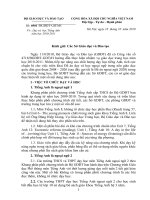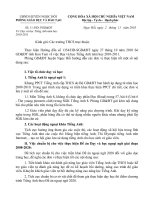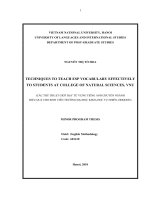KỸ THUẬT ĐỂ GIẢNG DẠY VÀ HỌC TIẾNG ANH THÀNH NGỮ HIỆU QUẢ
Bạn đang xem bản rút gọn của tài liệu. Xem và tải ngay bản đầy đủ của tài liệu tại đây (1.54 MB, 23 trang )
Seminar on Techniques to Teach and Learn English Idioms Effectively
CHUYÊN ĐỀ BỒI DƯỠNG ÔN THI THPT QUỐC GIA
MÔN: TIẾNG ANH
TÊN CHUYÊN ĐỀ:
KỸ THUẬT ĐỂ GIẢNG DẠY VÀ HỌC TIẾNG ANH THÀNH NGỮ HIỆU
QUẢ
Giáo viên: Bùi Thanh Huệ
Chức vụ: Giáo viên
Đơn vị: Trường THPT Tam Dương
Đối tượng: Học sinh
A. INTRODUCTION
I. RATIONALE
Idioms and idiomatic language are some of the most interesting and creative
vocabulary terms to learn in any language, but it also creates many misunderstandings
when communicating across cultures. According to English linguists, there are over
10,000 idioms in English, some relatively recent and some that have been used for
more than 2,000 years. People naturally admit that idioms provide vivid descriptions
and expressions that are more powerful and effective than literal and non-idiomatic
language. Thus, idioms and idiomatic language contribute to make a language more
colorful, as well as make it easier for English speakers to express their thoughts more
proficiently and natively.
It’s raining cats and dogs
Trời mưa rất to
47
Teacher: Bui Thanh Hue - Tam Duong High School
Instead of saying: “It’s raining heavily”, people can make it more interesting
by speaking out the idiom “It’s raining cats and dogs”. In English, “rain cats and
dogs” means raining heavily.
Although English idioms do not mean what they literally mean, a variety of
mass media, textbooks and everyday language represent rich sources of idiomatic
expressions, which causes a lot of difficulties for ESL (English as a Second
Language) students to understand their meanings and translating them into their
mother language. Mastering English idioms is quite a challenge to almost all ESL
learners because the figurative meanings of English idioms cannot be predicted
through an analysis of their individual meanings of words. It is not surprising that the
trouble with foreigners in any non-English speaking countries is that they take
everything Americans or English people say literally. On the other hand, idioms are
common in the daily life of English native speakers and provide a rich source of their
cultures. Apparently, teaching ESL learners to use English idioms fluently is
considerably critical for ESL teachers. In addition, students are often able to discuss
content, take notes, or create semantic maps for writing; however, they often do not
use the new words or concepts taught in class. In the wake of globalization and the
internationalization of English language demands ESL learners not only to merely
know English but also to use it effectively in intercultural communication.
Another reason that I choose this topic is that idioms appear in almost every
English test in general and one for the University Entrance Examination or now
National School Examination. In fact, the idiom-related questions account for from 8
to 10 percent of the total marks of the whole test.
Thus, in this minor study, I want to focus mainly on how to use various
effective techniques to teach English idioms to my students at Tam Duong high
school with the purposes of both preparing them for the National School Education
Examination and giving them a good chance to practise using English language in
daily communication.
II. OBJECTIVES OF THE STUDY
The study is designed to obtain the following objectives:
48
Seminar on Techniques to Teach and Learn English Idioms Effectively
Study and find out various effective techniques to teach and learn English
idioms in classes
Apply these techniques in teaching and learning English idioms in classes
III. METHOD OF THE STUDY
Integrated methods used in this study such as:
Making reference to linguistic books and articles on teaching and learning
English idioms
Putting the techniques into practice of teaching and learning English in classes
Considering the effectiveness of applying these techniques and creating any
necessary modification
IV. SCOPE OF THE STUDY
This seminar is applied to teach Grade 12 students ����������������������������������������������������������������������������������������������������������������������������������������������������������������������������������������������������������������������������������������������������������������������������������������������������������������������������������������������������������������������������������������������������������������������������������������������������������������������������������������������������������������������������������������������������������������������������������������������������������������������������������������������������������������������������������������������������������������������������������������������������������������������������������������������������������������������������������������������������������������������������������������������������������������������������������������������������������������������������������������������������������������������������������������������������������������������������������������������������������������������������������������������������������������������������������������������������������������������������������������������������������������������������������������������������������������������������������������������������������������������������������������������������������������������������������������������������������������������������������������������������������������������������������������������������������������������������������������������������������������������������������������������������������������������������������������������������������������������������������������������������������������������������������������������������������������������������������������������������������������������������������������������������������������������������������������������������������������������������������������������������������������������������������������������������������������������������������������������������������������������������������������������������������������������������������������������������������������������������������������������������������������������������������������������������������������������������������������������������������������������������������������������������������������������������������������������������������������������������������������������������������������������������������������������������������������������������������������������������������������������������������������������������������������������������������������������������������������������������������������������������������������������������������������������������������������������������������������������������������������������������������������������������������������������������������������������������������������������������������������������������������������������������������������������������������������������������������������������������������������������������������������������������������������������������������������������������������������������������������������������������������������������������������������������������������������������������������������������������������������������������������������������������������������������������������������������������������������������������������������������������������������������������������������������������������������������������������������������������������������������������������������������������������������������������������������������������������������������������������������������������������������������������������������������������������������������������������������������������������������������������������������������������������������������������������������������������������������������������������������������������������������������������������������������������������������������������������������������������������������������������������������������������������������������������������������������������������������������������������������������������������������������������������������������������������������������������������������������������������������������������������������������������������������������������������������������������������������������������������������������������������������������������������������������������������������������������������������������������������������������������������������������������������������������������������������������������������������������������������������������������������������������������������������������������������������������������������������������������������������������������������������������������������������������������������������������������������������������������������������������������������������������������������������������������������������������������������������������������������������������������������������������������������������������������������������������������������������������������������������������������������������������������������������������������������������������������������������������������������������������������������������������������������������������������������������������������������������������������������������������������������������������������������������������������������������������������������������������������������������������������������������������������������������������������������������������������������������������������������������������������������������������������������������������������������������������������������������������������������������������������������������������������������������������������������������������������������������������������������������������������������������������������������������������������������������������������������������������������������������������������������������������������������������������������������������������������������������������������������������������������������������������������������������������������������������������������������������������������������������������������������������������������������������������������������������������������������������������������������������������������������������������������������������������������������������������������������������������������������������������������������������������������������������������������������������������������������������������������������������������������������������������������������������������������������������������������������������������������������������������������������������������������������������������������������������������������������������������������������������������������������������������������������������������������������������������������������������������������������������������������������������������������������������������������������������������������������������������������������������������������������������������������������������������������������������������������������������������������������������������������������������������������������������������������������������������������������������������������������������������������������������������������������������������������������������������������������������������������������������������������������������������������������������������������������������������������������������������������������������������������������������������������������������������������������������������������������������������������������������������������������������������������������������������������������������������������������������������������������������������������������������������������������������������������������������������������������������������������������������������������������������������������������������������������������������������������������������������������������������������������������������������������������������������������������������������������������������������������������������������������������������������������������������������������������������������������������������������������������������������������������������������������������������������������������������������������������������������������������������������������������������������������������������������������������������������������������������������������������������������������������������������������������������������������������������������������������������������������������������������������������������������������������������������������������������������������������������������������������������������������������������������������������������������������������������������������������������������������������������������������������������������������������������������������������������������������������������������������������������������������������������������������������������������������������������������������������������������������������������������������������������������������������������������������������������������������������������������������������������������������������������������������������������������������������������������������������������������������������������������������������������������������������������������������������������������������������������������������������������������������������������������������������������������������������������������������������������������������������������������������������������������������������������������������������������������������������������������������������������������������������������������������������������������������������������������������������������������������������������������������������������������������������������������������������������������������������������������������������������������������������������������������������������������������������������������������������������������������������������������������������������������������������������������������������������������������������������������������������������������������������������������������������������������������������������������������������������������������������������������������������������������������������������������������������������������������������������������������������������������������������������������������������������������������������������������������������������������������������������������������������������������������������������������������������������������������������������������������������������������������������������������������������������������������������������������������������������������������������������������������������������������������������������������������������������������������������������������������������������������������������������������������������������������������������������������������������������������������������������������������������������������������������������������������������������������������������������������������������������������������������������������������������������������������������������������������������������������������������������������������������������������������������������������������������������������������������������������������������������������������������������������������������������������������������������������������������������������������������������������������������������������������������������������������������������������������������������������������������������������������������������������������������������������������������������������������������������������������������������������������������������������������������������������������������������������������������������������������������������������������������������������������������������������������������������������������������������������������������������������������������������������������������������������������������������������������������������������������������������������������������������������������������������������������������������������������������������������������������������������������������������������������������������������������������������������������������������������������������������������������������������������������������������������������������������������������������������������������������������������������������������������������������������������������������������������������������������������������������������������������������������������������������������������������������������������������������������������������������������������������������������������������������������������������������������������������������������������������������������������������������������������������������������������������������������������������������������������������������������������������������������������������������������������������������������������������������������������������������������������������������������������������������������������������������������������������������������������������������������������������������������������������������������������������������������������������������������������������������������������������������������������������������������������������������������������������������������������������������������������������������������������������������������������������������������������������������������������������������������������������������������������������������������������������������������������������������������������������������������������������������������������������������������������������������������������������������������������������������������������������������������������������������������������������������������������������������������������������������������������������������������������������������������������������������������������������������������������������������������������������������������������������������������������������������������������������������������������������������������������������������������������������������������������������������������������������������������������������������������������������������������������������������������������������������������������������������������������������������������������������������������������������������������������������������������������������������������������������������������������������������������������������������������������������������������������������������������������������������������������������������������������������������������������������������������������������������������������������������������������������������������������������������������������������������������������������������������������������������������������������������������������������������������������������������������������������������������������������������������������������������������������������������������������������������������������������������������������������������������������������������������������������������������������������������������������������������������������������������������������������������������������������������������������������������������������������������������������������������������������������������������������������������������������������������������������������������������������������������������������������������������������������������������������������������������������������������������������������������������������������������������������������������������������������������������������������������������������������������������������������������������������������������������������������������������������������������������������������������������������������������������������������������������������������������������������������������������������������������������������������������������������������������������������������������������������������������������������������������������������������������������������������������������������������������������������������������������������������������������������������������������������������������������������������������������������������������������������������������������������������������������������������������������������������������������������������������������������������������������������������������������������������������������������������������������ated idioms or teach sportsrelated idioms with picture dictionary or practice exercises. By using a common
theme to teach idioms, it is easier for students to grasp the meanings of the phrases,
and see how similar words can mean very different things in different contexts.
Here are some examples:
60
Seminar on Techniques to Teach and Learn English Idioms Effectively
LOVERELATED
IDIOMS
61
Teacher: Bui Thanh Hue - Tam Duong High School
TIME-RELATED IDIOMS
62
Seminar on Techniques to Teach and Learn English Idioms Effectively
Practice Exercise: Complete the following sentences to make a suitable common
idiom connected with the weather
1. I’m really sorry I won’t be able to see you this week but I’m absolute snowed under
with work.
2. “What’s the capital of Peru?”
“Sorry, I haven’t got the …………………… idea!”
3. Jane and Steve have what you might call a ……………….. relationship-they’re
always arguing and then making up again!
4. Julie is amazingly cheerful, she always greets everyone with a …………………….
Smile.
5. The decision to build the new motorway through the forest was met by
…………….. of protest from local residents.
6. Tom has been ……….. Maria with presents to make up for forgetting their wedding
anniversary last month.
7. One of the TV cameramen was hit in the leg when they were caught in a
……………….. of bullets outside the gang’s hideout.
8. The boss’s manner turned decidedly ……………………….. after I told her I was
looking for a new job.
9. I got home to find everyone in ……………………. of tears over the terrible news.
10. “Is Nick pleased about his new job?”
“Pleased? He’s on …………………. Nine!”
Answers:
2. foggiest
3. stormy
4. sunny
5. storms
63
Teacher: Bui Thanh Hue - Tam Duong High School
6. showering
7. hail
8. frosty
9. floods
10. Cloud
Explanation of Idioms:
1. be snowed under with work: be very busy with work (quá bận rộn với công việc)
2. haven’t got the foggiest idea: know nothing about something (chẳng biết gì về ….)
3. a stormy relationship: a relationship involving a lot of strong argument and
shouting (mối quan hệ đầy trắc trở, song gió)
4. a sunny smile: a very bright and happy smile (nụ cười rạng rỡ/tỏa nắng)
5. be met by storms of protest from somebody: to receive a lot of protest from
somebody (bị làn song phản đối/bị ai đó phản đối dữ dội)
6. to shower somebody with presents: to give a lot of presents to somebody (tặng ai
một cơn mưa quà tặng)
7. a hail of bullets: a lot of bullets thrown at somebody at the same time (a hail of
questions: các câu hỏi dồn dập)
8. a frosty manner: an unfriendly manner (phong cách/kiểu cách lạnh lùng/không
thân thiện)
9. floods of tears: a lot of tears on one’s face (Nước mắt giàn giụa)
10. be on cloud nine: be extremely happy (vô cùng hạnh phúc/ở trên 9 tầng mây)
(Source: Advanced English C.A.E- Grammar Practice)
7. Teaching and Learning English Idioms in contrast with Vietnamese ones
People generally agree that language and culture have a vey close relationship.
In other words, a language is always associated with its unique culture in terms of
traditional thoughts, religions, history and other cultural aspects. Our human language
64
Seminar on Techniques to Teach and Learn English Idioms Effectively
is much more than vocabularies, semantic or syntax rules, just purely spoken or
written language. Specifically, to utilize English as an effective means of
communication, ESL learners need to not only know linguistic items literally but also
understand them figuratively. Additionally, it is said that common experience in life
shapes the language. As a result, many students find it confusing when translating
English idioms into Vietnamese. For example, the English say “as strong as a horse”,
but according to Vietnamese people the physical strength is compared with a buffalo
or an elephant. Therefore, teachers should raise the awareness of different concepts in
using idioms between English speakers and Vietnamese ones.
At class, teaching and learning English idioms in contrast with Vietnamese
ones is considered a useful technique that can improve and enhance students’
idiomatic vocabulary.
English Idioms
Vietnamese Idioms
As strong as a horse
Khỏe như trâu
65
Teacher: Bui Thanh Hue - Tam Duong High School
As mute as a fish
66
Câm như hến
As poor as a church mouse
Nghèo rớt mồng tơi
Diamond cuts Diamond
Vỏ quýt dày có móng tay nhọn
Seminar on Techniques to Teach and Learn English Idioms Effectively
Love me, love my dog
Yêu ai yêu cả đường đi
Ghét ai ghét cả tông ti họ hàng
II. IMPLICATIONS
I have applied some of these techniques in teaching English idioms for students
at Tam Duong high school and got good results. My students now find it more
interesting not only to learn English idioms but also to learn English in general. In
fact, they seem not to be afraid of dealing with idiom-related questions in practice
tests, as well my students start to use some familiar and easy idioms in speaking tasks
at class. Especially, my students are very interested in making up a story using the
learnt idioms, which motivates them into studying English.
This seminar will be reasonably modified to meet the real situation of each
class and each group of students at their proficiency level. Teachers need to consider
what techniques are the most effective to their students or think of integrating some of
which together in order that students can develop their skills and enhance their
vocabulary.
67
Teacher: Bui Thanh Hue - Tam Duong High School
C. CONCLUSION
In brief, this study discovers some effective techniques to teach and learn
English idioms, in order to both prepare students for the National Examination and
improve their ability to use English. Although it is uncommon for ESL students to use
them comfortably and effectively, if we choose not to teach idioms in class, they will
miss an important cultural element of the language they strive to speak fluently. Since
it is vital for students to learn English idioms in order to master English, it is
important for teachers to design various activities for students to practise with English
idioms and subsequently acquire them efficiently. Moreover, students may learn
better, when they are provided with collaborative activities because they can interact
with peers and share fun in learning. Teachers should integrate listening, speaking,
reading and writing activities together in teaching English idioms, and make students
more interested in learning English.
Still, the dictionary definition may be inadequate for teachers to use in an
educational setting, and the meaning of idioms is almost impossible to understand
unless you make use of your cultural knowledge or have heard them before.
Furthermore, figurative expressions like idioms are frequently made use in everyday
situations and thus need to be focused by teachers. Idiom comprehension requires
learners to go beyond a simple word-by-word comprehension strategy and to integrate
figurative meaning.
To sum up, due to the limited time and scope this study only focus on a very
small aspect of teaching and learning English in ESL environment and remains some
limitations that need further studying. However, it is in the hope that it may provide
both teachers and students with useful techniques to teach and learn English idioms,
raise students’ awareness of learning and understanding the contextual meaning of a
language, and motivate students to learn English enthusiastically.
68
Seminar on Techniques to Teach and Learn English Idioms Effectively
REFERENCES
Carrick, L. (2001). Internet resources for conducting Readers Theatre. Reading
Online, 5(1). Available: />Carrick, L.U. (2006). Readers Theatre across the curriculum. In T. Rasinski, C.
Blachowicz, & K. Lems (Eds.), Fluency instruction: Research-based best
practices (pp. 209–230). New York: Guilford Press.
/> />
69









